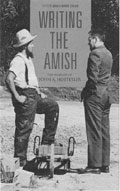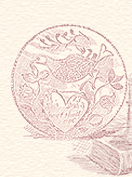2005 Annual Volume
The Pennsylvania German Broadside - A History Guide by Don
Yoder ;
Co-Published with the Library Company of Philadelphia and The
Pennsylvania German Society
Fifteenth-century
Germany was the birthplace of movable type and of one of its powerful
consequences, the broadside. Don Yoder's Pennsylvania German
Broadside examines the history and legacy of these printed sheets
within the Pennsylvania German Community. The author defines a
broadside as any piece of paper printed on one side that is intended
to be given away or sold.
2004 Annual
Volume
Writing the
Amish: The Worlds of John A. Hostetler

Edited by David Weaver-Zercher
“John Hostetler’s quiet
influence has reached every aspect of Amish studies. He knows more
about the Amish than anyone else, for he combines the experience of
being raised Amish, of having Amish siblings, with academic studies on
most aspects of Amish culture. . . . But his contributions have gone
much farther than academia. By influencing the dominant culture, he
has contributed to the growth and survival of the culture he chose to
leave.”—Gertrude E. Huntington
From the early 1960s to
the late 1980s, John A. Hostetler was the world's premier scholar of
Amish life. Hailed by his peers for his illuminating and sensitive
portrayals of this oft-misunderstood religious sect, Hostetler
successfully spanned the divide between popular and academic culture,
thereby shaping perceptions of the Amish throughout American society.
He was also outspoken in his views of the modern world and of the
Amish world-views that continue to stir debate today.
Born into an Old Order
Amish family in 1918, Hostetler came of age in an era when the Amish
were largely dismissed as a quaint and declining culture, a curious
survival with little relevance for contemporary American life. That
perception changed during Hostetler's career, for not only did the
Amish survive during these decades, they demonstrated a stunning
degree of cultural vitality, which Hostetler observed, analyzed, and
interpreted for millions of interested readers.
Writing the Amish
both recounts and assesses
Hostetler's Amish-related work. The first half of the book consists of
four reflective essays—by Donald Kraybill, Simon Bronner, David
Weaver-Zercher, and Hostetler himself—in which Hostetler is the
primary subject. The second half reprints in chronological order
fourteen key writings by Hostetler with commentaries and annotations
by Weaver-Zercher.
Taken together, these
writings, supplemented by a comprehensive bibliography of Hostetler's
publications, provide ready access to the Hostetler corpus and the
tools by which to evaluate his work, his intellectual evolution, and
his legacy as a scholar of Amish and American life. Moreover, by
providing a window into the varied worlds of John A. Hostetler—his
Amish boyhood, his Mennonite Church milieu, his educational pursuits,
his scholarly career, and his vocation as a mediator and advocate for
Amish life—this volume enhances the ongoing discussion of how
ethnographic representation pertains to America's most renowned folk
culture, the Old Order Amish.
David L. Weaver-Zercher
is Associate Professor of American Religious History at Messiah
College. He is the author of The Amish in the American Imagination,
reviewed in Volume 36, Number 2 of Der Reggeboge: Journal of The
Pennsylvania German Society.
Published with Penn State
University Press in the Pennsylvania German History and Culture
Series.
Congratulations
to Our Award-Winning Authors
The Pennsylvania German Society is proud to announce that two of its
recent publications have received major publishing awards.
Jeff Bach's Voices of the Turtledoves: The Sacred World of
Ephrata, the Society's 2002 Annual Membership Volume, has been
awarded The 2004 Dale W. Brown Book Award for Outstanding Scholarship
in Anabaptist and Pietist Studies by the Young Center for Anabaptist
and Pietist Studies at Elizabethtown College. Voices of the
Turtledoves was selected from more than a dozen books nominated for
the first-ever Brown Award, including honorable mention titles The
Earth Is the Lord's by Society member John L. Ruth and The Amish in
the American Imagination by Society contributor David Weaver-Zercher,
both of which have been reviewed in Der Reggeboge: Journal of The
Pennsylvania German Society.
Reviewers of Voices of the Turtledoves have praised the book's high
level of scholarship and Bach's ability to penetrate and analyze the
difficult and diverse sources of Ephrata's religious life and thought:
"Jeff Bach's work on the Ephrata Cloister presents a masterful study
of the various ideologies that influenced Conrad Beissel's mystical
beliefs, from astrology, Rosicrucianism and magic, to Anabaptism and
Pietism." Another reviewer remarks that "Bach's clear writing style,
skillful use of sources and excellent bibliographic essay makes this
book the most significant English language publication on the Ephrata
tradition and a key text in the growing scholarship on radical
Pietism. It will be a landmark study for years to come."
We thank Jeff Bach for his outstanding contribution to the PGS Annual
Volume series and the Young Center for recognizing his achievement.
The Pennsylvania German Society's other award winner is Nancy
Kettering Frye, who earned the Award of Commendation from the
Concordia Historical Institute for her article, "Trusting in
Providence: Henry Melchior Muhlenberg, the Year 1776," which appeared
in Volume 36, Number 2 (2002) of Der Reggeboge. Her work was
honored at the 29th annual awards banquet on the Concordia Seminary
campus in St. Louis. Each year, the institute recognizes people,
congregations, agencies, or boards for historical publications or
audiovisual media for their contributions to Lutheran literature, or
for personal service in the field of Lutheran archival and historical
work. Frye's article, a story of Muhlenberg's actions in trying times,
is described as a significant contribution to preserving Lutheran
history in America.
We congratulate both our award-winning authors. Please see the
Publications page of our website for information on how to order these
two outstanding Pennsylvania German Society publications. |













